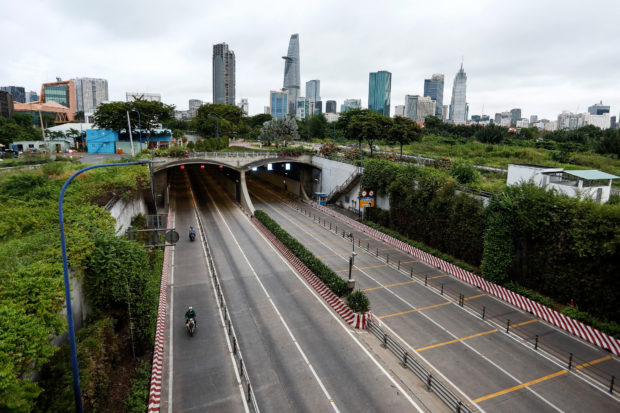Vietnam’s economic hub imposes night curfew as country battles virus surge

This general view shows a deserted motorway in Ho Chi Minh City on July 9, 2021, on the first day of the government imposed two-week lockdown as a preventive measure to stop the spread of the COVID-19 coronavirus. AFP
HANOI — More than 10 million residents of Ho Chi Minh City will be placed under a strict overnight curfew beginning Monday, an unprecedented move to curb infections as Vietnam battles a rapid Covid-19 surge.
After successfully containing limited coronavirus outbreaks last year, the communist country is now recording increasing infections and deaths fueled by the highly contagious Delta variant.
Hardest-hit are the northern industrial centers and Ho Chi Minh City in the south, which has registered more than 62,000 infections since April — making up the bulk of Vietnam’s 101,000 cases.
Authorities have restricted movement in the once-bustling economic hub for more than two months, and imposed a lockdown in early July. Residents are allowed to leave home only for medical emergencies and food.
But beginning Monday, an additional, strict stay-at-home order will be in effect from 6 pm to 6 am local time — though authorities refused to use the word “curfew”. No end date was announced for the measure.
Article continues after this advertisement“Local law enforcement will need to step up patrols… and issue appropriate penalties for offenders, even detention in cases of resistance,” said city mayor Nguyen Thanh Phong, according to state media.
Article continues after this advertisementAlmost all public transport links with the city have already been suspended, while travelers originating from the city are required to stay in mandatory quarantine centers for at least two weeks.
Currently, more than a third of Vietnam’s 100 million people are under a lockdown, including residents of its capital Hanoi in the north.
On Monday, the military drove through major boulevards across the city, spraying disinfectant as they went past historic buildings and Hoan Kiem Lake, a major tourist attraction.
An army officer told AFP that military personnel will continue the disinfection campaign over the next three days.
Vietnam was one of the few economies that expanded last year due to its success in containing the virus during the first wave of the pandemic.
But it has been slow to procure and administer vaccines, with just 4.7 million doses given so far.
It is also developing its own inoculations and authorities say they hope to reach herd immunity by early 2022.
For more news about the novel coronavirus click here.
What you need to know about Coronavirus.
For more information on COVID-19, call the DOH Hotline: (02) 86517800 local 1149/1150.
The Inquirer Foundation supports our healthcare frontliners and is still accepting cash donations to be deposited at Banco de Oro (BDO) current account #007960018860 or donate through PayMaya using this link.